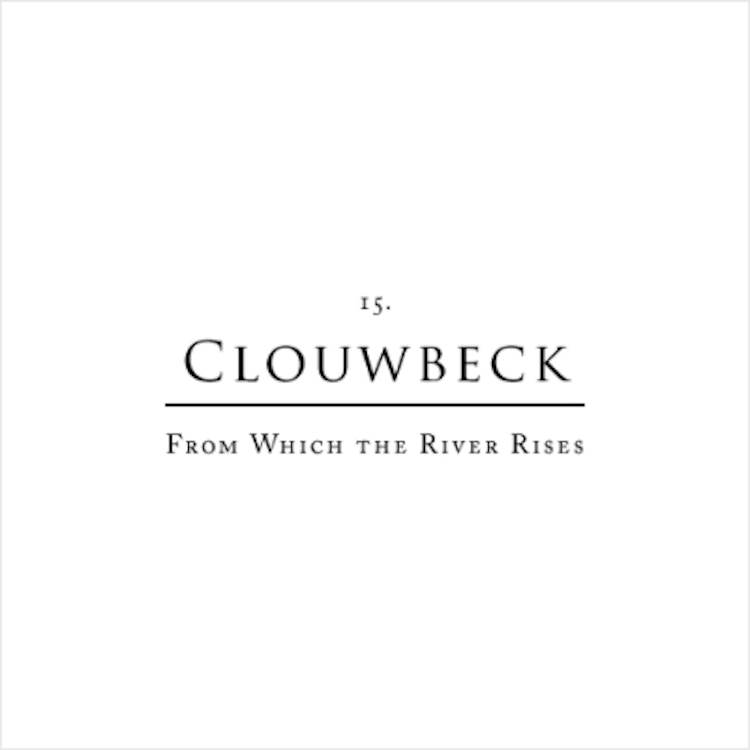"From Which the River Rises"

“I am haunted by waters” – Norman Maclean, A River Runs Through It
Richard Skelton’s recorded work has always had something of the alchemical about it; and as he refines and perfects his explorations and processes it’s tempting to think he’s approaching some grand unveiling, where he’ll reveal a chamber of relics, residues of captured moments, of transmutations, crossings over he’s made – crossings between the material and the non-material, between self and place. His latest release – From Which the River Rises, his third as Clouwbeck – is specifically about a relationship with water; and on it, Skelton’s is acting as pure conduit, dissolving the boundaries between himself and the flow of the river, and seeking to evoke the very tissue of experience, both in the sense of a relationship built up over time, and in the raw moment of being.
Always the Yarrow…
The river in question is the Yarrow, a river that runs across the West Pennine Moors in Lancashire. It formed one of the central obsessions for Skelton on his last album Landings and also featured heavily in the text that accompanied that record. In those combined mediums, Skelton explored the landscape in an intensely personal way, creating a kind of mythic internalised map, which he then projected outwards, remapping the terrain, and in some way re-claiming that terrain for his own purposes. It was a form of conjuring. On From Which the River Rises, Skelton takes a (moving) element of that landscape and seeks to know it and to make it known – to transmute its power into another medium. Kathleen Jamie has said of poetry that it is ‘a sort of connective tissue where myself meets the world’ and that she uses it to try to tease at that frail and febrile relationship, that most impenetrable of boundaries. Gerard Manley Hopkins was the great master of this, the shapes and sounds of his word hoard coming as close as it could ever be possible into making forms and media coalesce. Skelton is arguably coming closer than ever to achieving this with music.
If I spent enough time by its banks, could I get to know the river?
From Which the River Rises is made up of two long tracks, ‘Come the Aegir’ and ‘The Water’s Burden’, and you sense that this move into longer song forms has been shaped by hours of studying the Yarrow in all its moods and moments. As such instead of the at times microcosmic atmospheres of Landings or even previous Clouwbeck releases such as Wolfrahm, From Which… is dominated by long and sweeping bowed drones, which, on ‘The Water’s Burden’ collect and eddy around a bass undertow of simple piano figures. There is the signature Skelton tremble to the timbres, but there is a definite drawing out, a sense of shape and tumult with long periods of studied calm and quiet giving way to gradual intensities of volume and weight. And it’s these tumults that dominate the piece as a whole. In one sense they invoke the Yarrow in full spate and are an invocation of the sublime – at volume they are difficult to listen to, you might even say harrowing – but they also invoke something more subtle, something hinted at in the text of Landings.
Come down by the banks of the river. Place your hands in the water. And hold them there. Slowly let the cold take you. Close your eyes and yield. And just as this river has found its way into the landscape, century over century. Find your hands and arms between rock and stone. Find your place through touch and instinct. And I promise that just before the pain becomes unbearable. Before your body begins to shake uncontrollably. A deep stillness will wash over you. And you will forget. And by the banks of that river. The pain will slowly, imperceptibly subside. The gift of stillness will gradually pass. And your muscles will move again.
It was this passage that I first thought of when I heard From Which the River Rises, and more specifically, the opening track ‘Come the Aegir’ (for the record, the Aegir is a figure from Norse mythology, a personification of the ocean but the word also references a tidal bore that occurs in the Trent River in Lincolnshire). Whilst the tracks does seem to reference an oblique rising and falling of a period in the life of a river and indeed different tracts of the same moving body of water, it might also reference this sequence of events as described in Landings – the rise and falls of the bowed drones mimicking, transmuting the effects of the intense cold on the motions and whorls of the body.
If I spent enough time by its banks, could I get to know the river?
Its rapid tracts. Its sudden lulls.
Its changeling colour. Its constant cold.
If you placed me along its length, blindfolded, could I tell you where, just from its sound?
Would that be enough?
And it’s this subtlety I find so astonishing in Skelton’s work – this ability to evoke and invoke in such a meticulous and sustained fashion. The urge to document in such a way – this process of sustained watching of ‘looking narrowly’ – and to recreate these periods of scrutiny in another form is where the notion of alchemy comes into things. In some way it is a form of disappearance, as the artist seeks to absent himself, and simply become a medium of transmittance. It is enough that on this document Skelton seems within the bounds of achieving something like his stated aim, to get close to answering that final question – would that be enough? But imagine if we could listen closely and for long enough, and we could be laid blindfolded along the length of the Yarrow and know from these trembling recreations that we were in its misty grip, aligned with its contours and in thrall to its silvery sighing voice. That would be something would it not?
Get the Best Fit take on the week in music direct to your inbox every Friday

Prima Queen
The Prize

Femi Kuti
Journey Through Life

Sunflower Bean
Mortal Primetime






